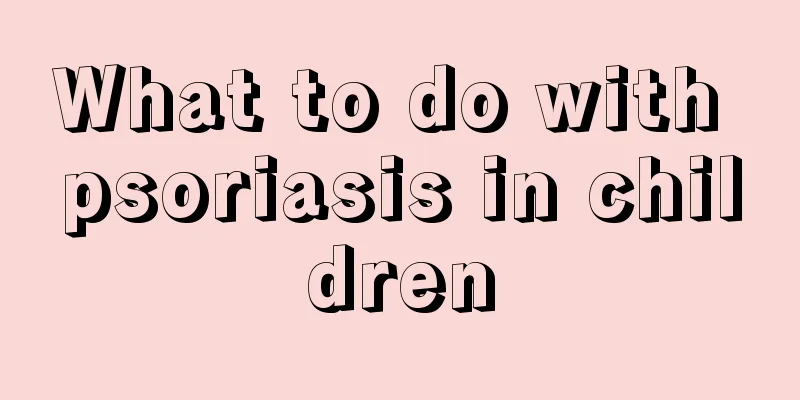What should children with allergic purpura pay attention to in their diet

|
When babies are young, because of their poor immunity, many children will suffer from various diseases. However, recently, allergic purpura in children has become a very difficult disease. This disease troubles many parents. The baby always receives treatment but there is no improvement. So in daily life, what should children with allergic purpura pay attention to in their diet? Henoch-Schonlein purpura is a microvascular allergic hemorrhagic disease. It manifests as skin petechiae, which mostly appear around the joints of the lower limbs and buttocks. They are symmetrically distributed and appear in batches. They vary in size and color. They can merge into patches and usually gradually disappear within a few days, but they can recur. Patients may have gastrointestinal symptoms. The causes of allergic purpura include infection, food allergy, drug allergy, allergies caused by pollen, insect bites, etc., but the cause of the allergy is often difficult to determine. It is more common in children and adolescents. During treatment, the cause of the allergy should be found out and avoided as much as possible. Drugs that increase capillary density and reduce permeability can be used. The combination of Chinese and Western medicines has better therapeutic effects. Traditional Chinese medicine takes promoting blood circulation and removing blood stasis, clearing away heat and detoxifying, strengthening the body and stopping bleeding, and enhancing immunity as treatment principles. The main Chinese medicines include Codonopsis pilosula, Astragalus membranaceus, Imperata cylindrica, White Peony Root, Donkey-hide gelatin, Rehmannia glutinosa, Scrophularia ningpoensis, etc.; Western medicines include Anluoxue, Rutin, Vitamin C, etc. Antihistamines such as diphenhydramine, promethazine, ancillary drugs, and chlorpheniramine can also be used according to the condition of the disease. Unless the condition is serious or there are special circumstances, glucocorticoids should generally not be used. This is especially true for children. Try not to use hormones or use them as little as possible when necessary to avoid side effects or hormone dependence. All kinds of allergenic foods should be avoided. Food allergy is a major cause of this disease. Foreign proteins in many foods can cause allergic purpura. These foods mainly include fish, shrimp, crab, eggs, milk, broad beans, pineapple, etc. Once a patient finds that a certain food is allergenic, he or she should not eat this food for life, and should not use cooking utensils and tableware that have come into contact with this food. In addition, patients with allergic purpura should not eat vegetables such as fresh flower buds that they have never eaten before, because it has been reported that plant pollen is also a common allergen. After understanding this, parents may have a clear idea in their mind and will never dare to let their children eat certain foods easily, especially when they don’t know whether their children are allergic to them. In fact, carefully picking out some allergic foods for children will also reduce the risk of children suffering from allergic purpura. Also, be sure to remind your baby not to eat something casually outside. I hope everyone will take this matter to prevent the occurrence of diseases. |
<<: Causes of Ascites in Children
>>: How to treat baby heat bumps
Recommend
What is cryptorchidism in children?
As a parent of a baby boy, you must be alert to a...
What should I do if my child always suffers from insomnia?
I believe everyone knows that sleep is one of the...
Two-year-old baby diet plan
When the baby is still in the cradle, the baby ca...
Is high white blood cell count serious in children?
If you find that your child's white blood cel...
How should children with ADHD be treated?
Attention Deficit Hyperactivity Disorder (ADHD) i...
What causes shortness of breath in children?
There are many possible reasons why a child may b...
The reason why babies hiccup before one month old
I believe that everyone must be very familiar wit...
Is cupping good for children?
Most of the time, cupping is performed on adults ...
How to regulate children's spleen and stomach
In fact, children usually run and jump, and their...
One-year-old baby suddenly cried in the middle of the night
If a one-year-old baby suddenly starts crying in ...
What is the reason for black spots on children’s faces?
Nowadays, people love beauty very much. If a chil...
A 5-year-old child has a cold, phlegm, and vomits when eating?
As children grow up, it is common for them to cat...
Treatment for dry and cracked skin on the legs
Maybe we all don’t know much about the problem of...
What are the main symptoms of ADHD in children?
The incidence of ADHD in children is quite high. ...
What to eat when baby has stomach upset?
Babies with poor stomachs can eat scorched rice s...









